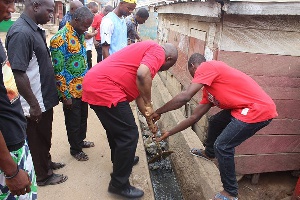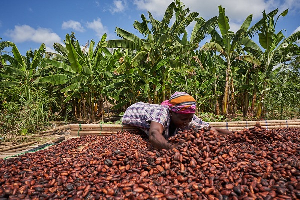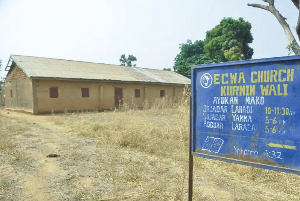The saying that cleanliness is next to Godliness is mostly espoused and used as a phrase by Ghanaians in our daily lives. It is an established fact that Ghanaians have an overzealous commitment to Godliness or the worship of God through the three major religions of Christianity, Islam and conservative adherence among other minority religions.
I understand the phrase was first recorded in a sermon in 1778 by John Wesley. Though of ancient, it admonishes us to wash or cleanup which symbolizes Godliness. What is clearly doubtful is our attitude to environmental cleanliness even though the majority of Ghanaians can pass for personal hygiene. This presupposes that as a people, we do not act on what we say or believe in, and especially so, we do not conform to what we espouse. If we so believe in what we espouse or say then we must keep our environment and bodies clean to reflect the phrase ‘cleanliness is next to Godliness’.
In Ghana, there are concerted efforts by government, institutions and some individuals to tackle environmental sanitation and personal hygiene issues but the conundrum is the people who constitute Ghana.
This feature will appraise government and private sector initiatives or efforts in environmental sanitation (how Ghana faired in the waste management industry) and then zero into the appalling lifestyles of the people which have badly affected the positive reflection of the efforts made so far.
GOVERNMENT AND PRIVATE SECTOR INITIATIVES
A report by the United Nations titled “18th Session of the United Nations Commission on Sustainable Development, National Report for Ghana Waste Management”, perceived that most of Ghana’s efforts before millennium era were more of policy inclined despite Government of Ghana’s (GOG) pragmatic strides to that effect. The report indicates that, although government had partnered with international institutions such as the World Bank in some waste management projects and other related programmes in the implementation of projects such as phases I, II and III of the Urban Development Projects in the 1990s, and the “Urban Environmental Sanitation Project (UESP) 1996- 2000” in Accra, Kumasi, Tamale, Takoradi and Tema which resulted in the construction of sanitary infrastructure such as night soil treatment plants and private toilets and then, DFID in the “Accra Waste Management Project” designed to address wastewater and night soil treatment options in the city, these efforts were and are still inadequate. The types of waste generated in Ghana are solid, liquid, radioactive and hazardous waste among others.
A Zoomlion sponsored study in 2013 by Ranjith Annepu and Nickolas J. Themelis of the Earth Engineering Center, Columbia University, states that 82% of the Accra Metropolitan Assembly (AMA) funds were spent on solid waste management (which basically is manmade) most of this was on collection and transportation only. This is indicative of the fact that most of the assemblies spend hugely on solid waste management alone and for that matter manmade waste. A reason for all stakeholders to be interested in finding lasting solutions to the menace.
GOG’s Waste Management Departments (WMDs) at the MMDAs were and still are making efforts in the same direction but do not have the requisite resources to fight the menace hence the need for a massive private sector intervention.
Government through policy direction had to give way to the private sector to overcome the failures of the WMDs of the assemblies which were as a result of bureaucracy, inadequate skills and technology, and lack of supervision among others.
The bane of our sanitation problems is largely attributed to the rural-urban migration phenomena which triggered the increase of urban waste generation despite the several efforts by government to ensure there is a policy framework to guide the management of environmental sanitation and waste management across the cities and towns in the country. Experts have unscientifically estimated that Ghana’s population has almost doubled in ten years and the population of rural-urban migration has reached unimaginable trends, a reason for the huge waste management deficits in the city centers despite the mushrooming of private waste management companies.
Related legislations for the control of waste disposal and environmental sanitation were already enacted as early as the 1990s even though this didn’t mirror positively in action. For instance, the Local Government Act, 1990 (Act 462), the Environmental Assessment Regulations, 1999 (LI 1652), the Pesticides Control and Management Act, 1996 (Act 528) the Criminal Code, 1960 (Act 29), Water Resources Commission Act, 1996 (Act 522), National Building Regulations, 1996 (LI 1630) and some MMDAs bye-laws among others were already in place but the major issue was and suffice to say is still that, these laws and policies do not get enforced by the law enforcement agencies. If at all it does, it is done not on the rigid basis at least and that has given the free space for the current water pollution, haphazard waste disposal and illegal mining also known as galamsey across the country.
The typical Ghanaian culture is talking and talking and talking without action. Many laws have been passed by parliament and have not been enforced, many government promises have been made to the people and have not been fulfilled and yet it is nobody’s business to check anybody in the lane which is a recipe for disaster. In contemporary times, the world has awakened to walking the talk a way forward for the Ghanaian leader.
In a study on the topic “Private Sector Involvement in Solid Waste Management in the Kumasi Metropolitan Assembly”, submitted to the Kwame Nkrumah University of Science and Technology (KNUST) in May 2014, Maxwell Wiafe observed that private waste management companies by performance were quite higher in terms of efficiency and service quality as compared with the Kumasi Metropolitan Assembly (KMA) because the private companies possess independent economic, political and financial abilities which enable them to operate freely and effectively. A justification for private intervention because the situation cannot be quite different from the other MMDA areas.
Private enterprises, therefore, penetrated the system and have made strenuous efforts to bring the country this far in the waste management industry. Fortunately, every government has shown serious interest in this industry and has encouraged the private sector participation to improve our standards what is left is the Ghanaian attitude and mentality.
Some of the very forceful companies in this industry in Ghana are Zoomlion Ghana Ltd, J. Stanley Owusu Co. Ltd, Y.N.O Enterprise Ltd, Zoompak Ltd, Zesta Environmental Solutions Ltd and Erksarp Ventures. The rest are Apedum Waste Services Ltd, Bioland Ltd, Keen 2 Clean Services Ltd, New Era Waste Concept, Golden Falcom Ltd, Early Sunrise Trading Co. Ltd, Asadu Royal Seed Waste Management, Premko Waste Ltd, Savanah Waste Management Services Ltd, Upper East Waste Ltd, Urban Waste Ltd, BA Waste Ltd, Ashanti Waste Ltd, Eastern Waste Ltd, Coastal Waste Ltd, Meridian Waste Management Services, Jam Waste Management Company, Habana Waste Management Services and Home Refuse Collection Enterprise and so on.
If we are smelling and feeling fresh today in the cities of Accra, Koforidua, Kumasi, Tema, Tamale, Wa, Sunyani, Ho, Cape Coast, Bolgatanga and Navrongo among other cities, then we must, of course, appreciate the efforts of these entities and the MMDAs.
The presence of these waste management companies in the city and urban centers and Zoomlion in the most remote areas serves as a citadel of awareness creation among the people to manage waste and keep their surroundings clean. In the urban areas, there are many of these companies that are doing very well to augment government and Zoomlion’s efforts especially in street cleansing, door-to-door waste collection and janitorial work at homes and institutional levels.
In Accra for instance, so many of the private waste management companies are concentrated there among which are Zoomlion, Zoom Alliance, Zoompak, Rural Waste, Accra Waste, UPPR, ACARP, Zoil Services Ltd and particularly the Apedum Services which is into solid and liquid waste management at the Labone, Cantonments and Airport areas. In the Tamale Metropolis, Zoomlion, Savana Waste, Jam Waste, Home Refuse Collection and Habana Waste with the Metropolitan Waste Management Department (MWMD) indirectly partner to ensure that homes, offices, schools and institutions, as well as the streets and markets, are neat all the time.
SPECIAL CONTRIBUTION BY ZOOMLION
Zoomlion Ghana Limited is one of the private waste management entities established and owned by a Ghanaian, Dr. Joseph Siaw Agyepong which has grown into a multinational company with several subsidiaries within the period of about eleven years.
The company was incorporated in 2006 under the Companies Act 1963, Act 179 with the fundamental mandate in waste management services and environmental sanitation. The company has undoubtedly and justifiably so partnered with the Government of Ghana and other partners in the industry to improve the country’s waste management industry under the leadership of H.E John Agyekum Kuffuor, H.E. Prof. John Evans Atta Mills and H.E John Dramani Mahama, all former presidents of the Republic of Ghana and now, under the government of H.E. Nana Addo Dankwa Akufu-Addo.
The company in collaboration with the Ministry of Local Government and Rural Development (MLGRD) and other government agencies is so far the only waste management company that knows no geographical boundary in Ghana unlike the rest mentioned above which is basically limited in one metropolis, municipality or district. It has branches and offices with state of the art equipment in all the ten regions and specifically the 216 MMDAs.
The company has been widely applauded by Ghanaians and the international community and currently has operational extensions in Equatorial Guinea, the republics of Togo, Liberia, Zambia and Angola.
The owner Dr. Joseph Siaw Agyepong and the company and its subsidiaries have won several enviable local and international awards such as the GOG Order of the Volta, 2008, Millennium Excellence, Leadership in Industry 2010, Entrepreneurial Foundation of Ghana, Best Environmental Sanitation Company of the Year, 2010, KNUST Honorary Doctorate Degree, 2011, Finalist in the Masters Category of Ernst and Young West Africa Entrepreneur of the Year Award in 2011, Liberian Government Golden Image Award, 2011. Others include Entrepreneurial Foundation of Ghana, Best Entrepreneur of the Year, 2011, Best Employer of the Year Award by GIPC, 2016, Zoil: Best Company in the Application of Technology in Oil Waste Management, 2017, Businessman of the year Magnate at Emy Exclusive Man of the Year Awards, 2017 and many others.
In every MMDA is the company’s District Manager who heads the team of two monitors, an administrative assistant and a number of drivers and janitors who draw salaries and have their SSNIT and provident funds contributions paid directly by Zoomlion. Others whose allowances are paid by government but mostly pre-financed by the company in collaboration with the Youth Employment Authority (YEA) are the Sanitation Guards under the Sanitation Improvement Project (SIP) and Spraying Gangs under the National Malaria Control Programme (NAMCOP) and MMDA Disinfestation and Fumigation Programme (MMDADFP) among others.
In fact, Zoomlion is one of the highest employment avenues in Ghana probably after GOG, the company has employed some 3,000 core staff with various educational qualifications from JHS, technical to professorial levels (made of directors, managers, foreign specialists, supervisors, officers, clerical staff, drivers, janitors etc). In addition to this, the company has engaged or caused to be engaged over 85,000 project staff across the country.
One remarkable mechanism worthy of commendation by the company is that it has embarked over the years on rigorous national and community public education programmes using television, radio, durbars and fora, social media and the print to sensitize Ghanaians on the need to keep personal hygiene and their surroundings clean.
This company constructed and established the Accra Compost and Recycling Plant, a three-phase plant specialized in executing composting, recycling and liquid waste treatment, it has an edifice to temporally hold waste to be transferred by a bigger vehicle to the final disposal site, Zoompak Transfer Station, a medical waste treatment plant to handle all waste generated from our hospitals using an autoclave and has built and operates the Lavender Hill treatment plant for liquid waste treatment. This company established a waste management institution of higher academic learning in furtherance of bringing knowledge and further training to its staff in Ghana and Sub-Sharan Africa called the Africa Institute of Sanitation and Waste Management (AISWAM) with affiliation to the KNUST.
One fundamental question that begs answers is whether the Ghanaian media has not seen or heard about these spectacular developments. If we can project politicians and little developmental projects by philanthropists in the communities why not highlight these achievements of the company that has given many well-meaning Ghanaians jobs and raised Ghana’s name internationally. Why keep quiet about the benefits and positive development projects planned and implemented by this company to attract foreign investors to partner with companies and institutions such as the Jospong and Zoomlion groups in the industry.
In its efforts to ensure that waste is not just collected and dumped, Zoomlion has also imported knowledge for hundreds of it staff such that, every year the group’s staff are meticulously selected on need basis and sent to countries such as the United States of America, Germany, Israel, China, India, Brazil and so forth for at least one month industrial training after which staff return to make impact in whatever they were already doing. Such knowledge is shared with their colleagues to enhance operations and I am sure that has made the company triumph over its competitors usually described as development partners by the company.
Whatever the case may be, development journalism is a process that examines critically existing development programmes and projects of a country and comparing such planned projects with its actual implementation, and report any observed successes and challenges as well as make recommendations to the parties involved in such projects and programmes for re-planning.
Contemporary Ghanaian journalists are therefore encouraged to develop an interest in development communication (also referred to as investigative journalism) instead of the traditional way of camaraderie facilitation induced journalism that we are much into.
Recently, the Ghana Journalists Association (GJA) admonished members to be balanced in their reportage especially in practicing development/investigative journalism so as not to court unnecessary media trial of people and institutions. Many people did not support that admonition especially when it practically failed to mention names but I brutally do support such an open call because as a regulatory body, it falls within the ambits of the GJA to periodically remind us journalists of our ethics and code of conduct. We cannot expect the Christian Council, the Muslim Society, the Ghana Peace Council, The Ghana Bar Association, CHASS or Nananom to caution journalists about what they do on daily basis. For me, GJA’s President Dr. Affail Monney became a victim of circumstances by the outburst of civil society groups and some senior journalists for doing just what was expected of him.
As a developing country, journalism for development should, therefore, be our focus, not event coverage or reportage. Our work should be “go finding” and reporting the facts not only what will satisfy or confirm our set objectives but the bare facts for the benefit of humanity.
We should endeavor to practice journalism focused on FACT finding and not FAULT finding. The work of investigative journalism must, therefore, be commended as done by the GJA in its statement.
THE HUMAN FACTOR
The Ghanaian mentality about environmental sanitation in spite of the numerous and unending public awareness and education programmes by Zoomlion and the government which even led to the institutionalization of the National Sanitation Day is still undesirable.
To them (some Ghanaians), the issue of waste management or environmental sanitation is in the chest of Zoomlion. People sit in vehicles and throw empty water sachets onto the streets, and when asked why the obvious is the answer, that is the work of Zoomlion. This presupposes that we citizens should engage in a waste generation without recourse to its disposal and management for that matter and the collection and management being the burden Zoomlion or the waste management companies. There are so many houses and offices in the villages, cities and urban areas that have not made provision for toilet facilities or restrooms which has led to the usage of polythene bags as means of toilets in rooms when under pressure or opened defecation in the rural areas which has contributed largely to the outbreak of diseases and flooding.
It is a norm in Ghana to buy food or water or tomatoes or even yam and the polythene bags will accompany it as a packaging obligation. Only a hand full of people do dispose of these polythene bags properly after use when in the same market there is demand for these polythene bags and other plastics for recycling purposes.
Whenever it rains, it is not as though there is too much downpour but the plastics choke the gutters and drainages which is the cause of Ghana’s seasonal flooding, cholera and malaria outbreaks among others. Some phenomena which have taken several lives and property in various parts of Ghana, the worst of which was the June 3 disaster in 2016 in the capital Accra.
In our daily lives, we have become a nation of ‘polythene bags’ which we use in everything we do. Going to the market or school or church/mosque wherever the polythene bag is an asset. The sachet water popularly called “pure water” has even become our best friend and worst enemy. At the lorry stations, bus stops, markets, rest stops, churches, mosques, lecture halls and classrooms, wedding ceremonies, child naming ceremonies etc, this is what we serve our water in but nobody cares if the empty ones are properly disposed or not and the result is unthinkable.
One very common thing in Ghana in particular and Africa as a whole is when we are advised against disasters we do not heed but when it occurs we keep calling and crying for government and institutional interventions ‘oh like seriously’? Why have we refused to change for the better at all? How many times can government step in for the people? Somebody will say all the time but has government ever satisfied people when disasters occur? The indiscipline in our country, the blatant disregard for warnings and precaution is causing us a lot and that is the attitude being talked about here.
Waste management and environmental sanitation must be everybody’s concern. Let us make this clarion call constantly for the clergy to add to their sermons some education about environmental sanitation and waste management during worship times. It is not out of place to appeal to the leadership of the Ghana Private Road Transport Union (GPRTU) to always ensure that there are enough litter bins at their stations for passengers and families to properly dump waste. In their capacity as leaders, they should always caution their drivers and bus conductors and ensure that they provide litter bins in their buses/cars and educate in brief the passengers before leaving the station on how to manage the waste while in the vehicles.
Our market women and men whom I see as “senior waste generators” must also be made to play a central role in this effort to keep the markets clean and the security agencies must be ready and willing to arrest and punish culprits in the presence of people to deter others.
The MMDAs should enforce their bye-laws for those laws were not made for the sake of beauty, the sanitation courts must be decentralized to the regional and district levels and made to work to ensure that the people of this country are up to the task in terms of environmental sanitation and waste management. The private sector should design proposal and engage the local government authorities and parliament for that matter for the right to arrest and process culprits for court against indiscriminate waste disposal as done during the ‘saman saman’ days to bring sanity to our society.
In my daring state, my quantum call and religious appeal in this subject matter is that, the government and for that matter the President of the Republic H.E. Nana Addo Dankwa Akufu-Ado should muster the political will and courage and, leave a legacy in Ghana of a total prohibition of the use of the polythene bags and water sachets. His colleague President Paul Kagame of the Republic of Rwanda (my preferred home after Ghana) did this successfully in his country and is still winning elections. This has brought so much environmental discipline and cleanliness in that country. If Accra ever looked like Kigali in terms of sanitation and waste management or cleanliness Ghana will top Africa in tourism.
This is unsolicited but a suggestion when regarded will scale the president to be a citizen but not spectator by walking his talk in making Accra and Ghana the cleanest in the whole of Africa as promised.
Let us together believe in the saying that cleanliness is next to Godliness and live it so that we can get closed to God our maker and saviour. Keeping Ghana clean must be a shared responsibility. Your duty, my duty our duty.
Opinions of Tuesday, 26 September 2017
Columnist: Francis Atayure Abirigo















